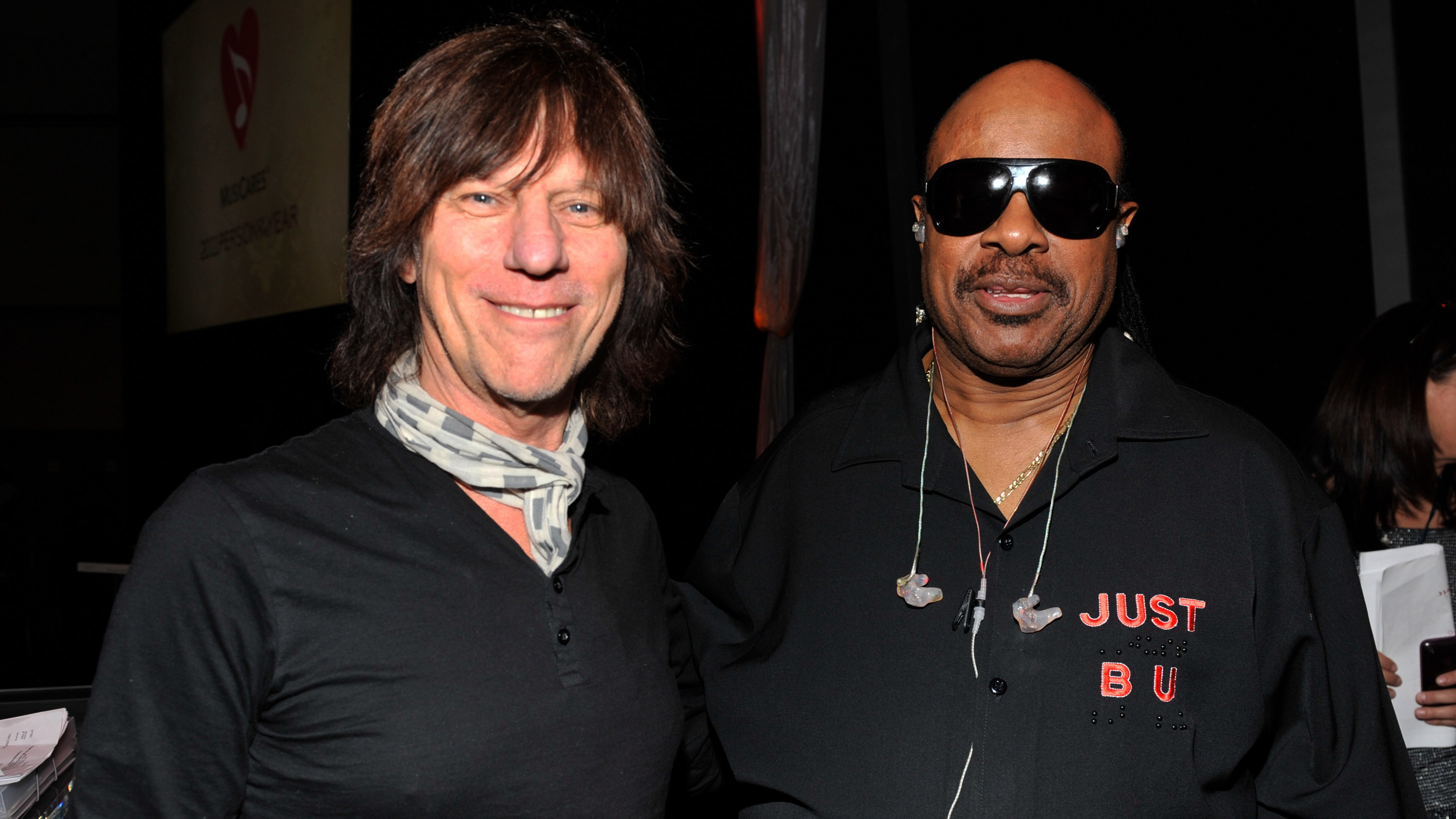"He wrote it for me, but the record company had the power to prevent any other record coming out and they said, ‘This is a number one smash: Beck doesn’t get this’”: The story of the Stevie Wonder and Jeff Beck connection
Denied the song Stevie Wonder wrote for him, he instead gifted the guitarist a composition that would inspire one of his greatest performances

There's no ultimate test of what makes a great guitar instrumental. But fine melody, emotive performance and technical prowess are a pretty good start. Top-notch production won’t hurt either and success in the charts does at least tell you that a lot of people like it.
One particular barometer, however, informs us that other great musicians also think it’s cool: when you find guitar and amp demonstrators performing it at trade fairs. These guys are at the top of their game, understand composition, recognise ability and know all about tone.
Time was when Jeff Beck’s interpretation of Stevie Wonder’s Cause We’ve Ended As Lovers would always be heard at major guitar shows in Los Angeles, Frankfurt and across the UK. So full of dynamics and expression is this masterful Beck performance that it was often considered the perfect vehicle for showcasing the capabilities of both player and equipment.
The number highlights the touch, tone and technique of the late 'guitarist’s guitarist', but Jeff should have got another Wonder song entirely.
After the demise of various Jeff Beck Group line-ups, the ex-Yardbirds guitarist had high hopes for his power trio, Beck, Bogert & Appice, formed at the end of 1972. But it wasn’t to be and the band broke up in early 1974.
“We needed the catalyst, somebody to write these incredibly interesting songs or riffs that we could get off on,” Jeff told this writer in 1989. “Unfortunately, it wasn’t forthcoming – I was into Stevie [Wonder] and I wanted to be doing more black, souly stuff.”
Wonder wrote Cause We’ve Ended As Lovers for his wife Syreeta, but gave it to Jeff after Motown Records insisted Stevie record Superstition himself, a track he’d actually composed for Beck. Wonder had penned it as a thank-you to Jeff for playing on his 1972 album Talking Book.
Get the MusicRadar Newsletter
Want all the hottest music and gear news, reviews, deals, features and more, direct to your inbox? Sign up here.
“The idea was that I was going to guest on his record and he was going to give me a song in return,” said Beck. “Stevie gave me [Cause We’ve Ended As Lovers] as an apology for releasing Superstition first. He wrote [it] for me, but the record company had the power to prevent any other record coming out and they said, ‘This is a number one smash: Beck doesn’t get this’.”

Jeff did end up recording Superstition with Beck, Bogert & Appice, but it was overshadowed by Wonder’s chart-topping version. Yet it’s arguable Beck got the better vehicle to express his talents with. Its moody C minor key and unusual chord changes would enable him to use almost every nuance in his arsenal of licks, tones and techniques.
Recorded at Air Studios in London with Beatles producer George Martin, Beck found the experience both inspiring and intimidating. “As ever there, the atmosphere was great,” he told Total Guitar later about recording the song. “When you’re in a good studio with good people, sometimes tracks can just come together out of nowhere. I am always amazed at what people can create when they are in the right mindset.”
George Martin always made me feel like I was in the headmaster’s office when I was in a studio with him
Working with Martin, though, was something of a double-edged sword. “George Martin always made me feel like I was in the headmaster’s office when I was in a studio with him,” Jeff confessed to Total Guitar. “I always tried to be on my best musical behaviour. But he had a unique way of hearing and visualising tracks so we got to create some amazing music.”
In his 1989 interview with me, Beck elaborated further: “At last there was somebody who spoke the same language, musically. We were actually getting down to the mechanics, the nuts and bolts of making good sounds on record. He frameworked some pretty simple tunes and made them sound magnificent.”
Tonal variation’s free when you’ve got an electric guitar, and it’s completely up to you
Jeff Beck
Listening to the techniques and tones on Cause We’ve Ended As Lovers, nothing is played ‘straight’. The track’s intro uses violining: picking a note with the volume down and slowly swelling it back in; Beck constantly manipulates his guitar’s controls to vary input gain and drive, switches pickups, or bends, slides and pulls strings in all manner of ways.
“There’s really no fun in keeping things simple, is there,” shrugged Beck. “Tonal variation’s free when you’ve got an electric guitar, and it’s completely up to you – there’s no law [that] says you can’t switch pickups in the middle of a solo to add that little bit more interest. I could never see the ultimate satisfaction in doing a load of end-to-end tricks, without resting and letting your soul come through a bit more.”
Phil Hilborne – guitarist, transcriber and teacher extraordinaire – has played the song at all the major guitar fairs. He picked up on Jeff’s “soul” reference: “I played it at the NAMM show and can’t think of a tune that equals it for showcasing touch, tone and soul. The melody is memorable – anyone can whistle it – and Jeff played it with such purity and beauty that it’s just about incomparable.”
Speaking of tone, while we know that for years Beck has preferred Strats, the Blow By Blow album sleeve depicts him playing his ‘oxblood’ Gibson Les Paul. Was this the instrument he used to create one of the most emotive instrumentals ever recorded? It seems not. With an apology to the guitar’s namesake and personal hero, he confesses: “Fender Telecaster… sorry Les!”
“Every note counts and fits perfectly”: Kirk Hammett names his best Metallica solo – and no, it’s not One or Master Of Puppets
“I can write anything... Just tell me what you want. You want death metal in C? Okay, here it is. A little country and western? Reggae, blues, whatever”: Yngwie Malmsteen on classical epiphanies, modern art and why he embraces the cliff edge









